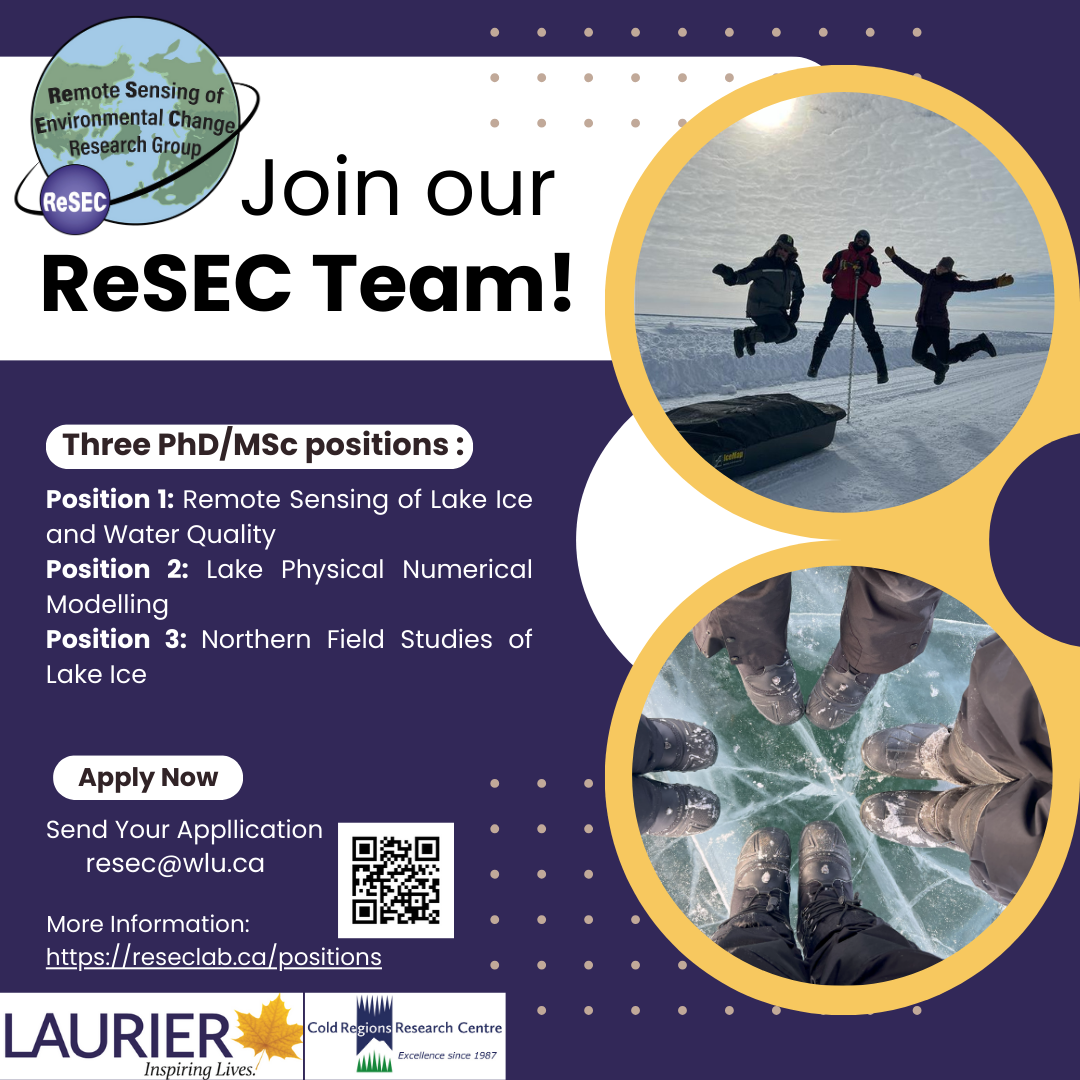Three Ph.D/M.Sc. positions available in Remote Sensing of Environmental Change Group: Geography & Environmental Studies, Wilfrid Laurier University
We are seeking motivated individuals interested to join the Remote Sensing of Environmental Change (ReSEC) Research Group in the Department of Geography and Environmental Studies at Wilfrid Laurier University, Waterloo, Canada.
Our current research focuses on remote sensing and numerical modeling, complemented by fieldwork at Canadian Northern Lakes, particularly in the Northwest Territories. The goal is to enhance our understanding of hydrologic systems and lake-ice-atmosphere interactions under the influence of climate change. Our lab employs various advanced techniques, including satellite imagery, Unmanned Aerial Systems (UAS), smart snow and ice sensors, Ground Penetrating Radar system (GPR), and Remotely Operated Vehicles (ROVs) for underwater exploration. The prospective research aims to “bridge the gap” between small-scale findings and large-scale predictive algorithms related to lake ice dynamics and water quality in changing climate.
Beginning in September 2025, under the supervision of Dr. Homa Kheyrollah Pour, three full-time graduate student positions (PhD and Master’s level) are available:
Position #1 (PhD/MSc): Focused on Remote Sensing Analysis of Lake Ice and Water Quality: This position will involve the use of satellite imagery and advanced remote sensing techniques to monitor and analyze lake ice dynamics and water quality, with an emphasis on the impacts of climate change.
Position #2 (PhD/MSc): Focused on Lake Physical Numerical Modelling.
This position will develop and apply numerical models to simulate physical processes in lakes, including ice dynamics, hydrodynamics, and lake-atmosphere interactions at both one-dimensional and three-dimensional scales.
Position #3 (PhD/MSc): Focused on Northern Field Studies of Lake Ice.
This position will involve extensive fieldwork in northern Canada, particularly in the Northwest Territories, to collect data on lake ice characteristics and dynamics. This data will be used to support and validate remote sensing and modeling efforts.
Students interested should have a background and experience in one or more of the following areas: Geography, Physics, Earth Science, Geomatics, or Engineering. Proficiency in programming, writing, statistical analysis, and the ability to work both independently and collaboratively is essential. Experience with Python is highly desirable, but proficiency in other programming languages (such as R, MATLAB, or similar) is also acceptable, particularly for Position #2. For Position #3, field experience is an asset but not required.
If this opportunity interests you and you meet the above requirements, please submit your application electronically as a single PDF file to resec@wlu.ca . Include “ReSEC_PhD/MSc_Position#_YourName” in the subject line.
Your applications should contain:
- CV
- A cover letter stating your motivation for applying to this position and your research interests
- Copy of transcript(s)
- Contact information for 2 references
The positions will remain open until filled. If you have any questions or concerns regarding any of the positions above, please contact resec@wlu.ca.
Laurier is committed to increasing the diversity of students and welcomes applications from candidates who identify as Indigenous, racialized, having disabilities, and from persons of any sexual identities and gender identities.
We thank all applicants for their interest; however, only those candidates selected for interviews will be contacted.

Two M.Sc. positions available in Geography & Environmental Studies, Wilfrid Laurier University
The Dehcho Collaborative on Permafrost (DCoP) is looking for two graduate students at the M.Sc. level to
examine the impacts of permafrost thaw and/or wildfire on the hydrology of peatland complexes with
discontinuous permafrost in the southern Taiga Plains ecoregion, Northwest Territories, Canada.
DCoP is a fusion of leading-edge scientific and Indigenous knowledge on permafrost focussed on developing new
methods and predictive tools to help manage permafrost and adapt to permafrost thaw. See a short video on DCoP:
https://youtu.be/Niy7R0sXeZg.
Field studies will be based at the newly renovated Scotty Creek Research Station (http://www.scottycreek.com/).
The Łı́ı́dlı̨ı̨Kų́ę́ First Nation recently took on the leadership of the station, making Scotty Creek one of the first
Indigenous-led research stations in the world and a “flagship” for scientific-Indigenous collaboration in Canada’s
North (http://scottycreek.com/DCoP/).
Applications are now being accepted for a start date of September, 2025.
For more information, please contact William Quinton: wquinton@wlu.ca, 519-635-0210

